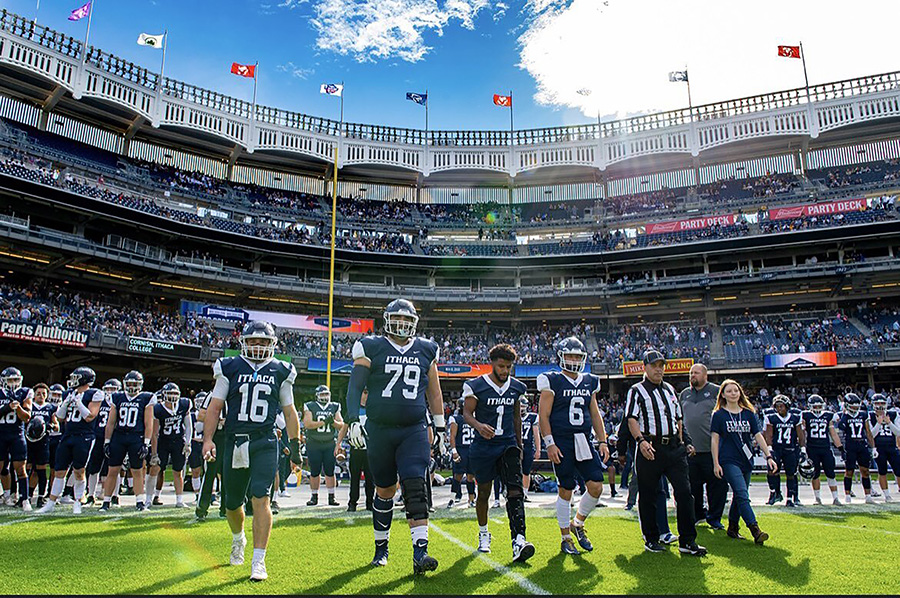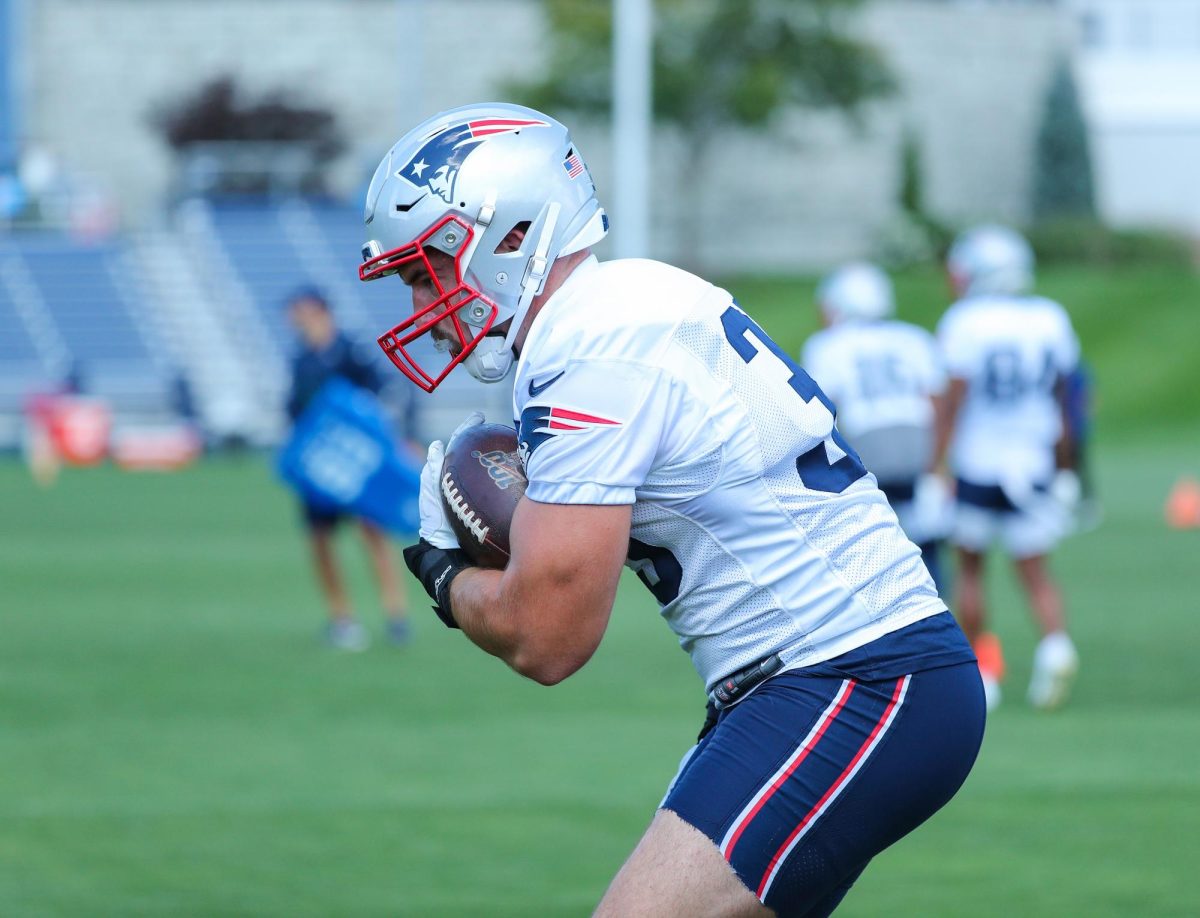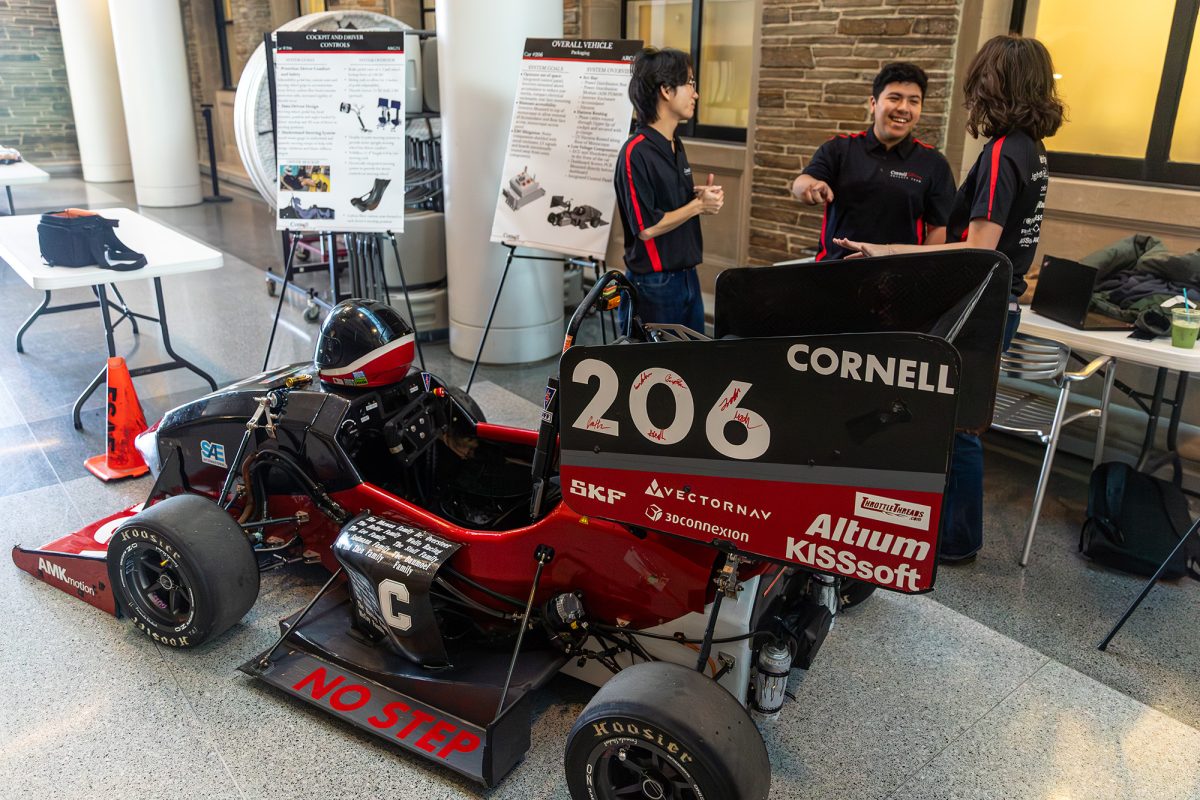Making a career in professional football is something only 1.6% of all collegiate football players will achieve. It can be even more difficult for athletes who did not go to Division I schools, which normally offer better training resources, more exposure to scouts and recruiters and a higher level of competition.
For Jacob Villanueva ’22, a two–time All-American Offensive lineman, that has not prevented him from reaching the pro ranks and signing a contract with Los Gallos Negros de Querétaro, an American football team located in Mexico.
Originally from Chino Hills, California, Villanueva grew up playing basketball. It was not until moving to Philadelphia that he was drawn to football.
Villanueva played for fun, and it was not until high school that he said he realized he had the talent and ability to play football in college.
“Sophomore, junior year, the recruitment started to pick up,” Villanueva said. “Then my high school football coach was like, ‘If you really work hard and put your mind to it, you can play football at the next level.”
Villanueva joined the Bombers in 2018 as an offensive lineman (OL). Being on the OL is a physically taxing position to play, as noted by senior lineman and former teammate Anselmo Farrell.
“Every play you’re getting hit in the head, you’re getting hit in the body, and it does wear you out a bit,” Farrell said. “There have been times when it’s been hard for me to do school work or be in class just because my head hurts, and my body hurts.”
This was not a deterrent for Villanueva and by his sophomore year, he was starting in every game.
When Villanueva finished the 2021 season, he was named to the Liberty League offensive first team. He also earned All-American Honors from both the Associated Press and the American Football Coaches Association (AFCA).
It was around this time that Villanueva began getting offers from professional teams to play for them. Teams from all across Europe, including from Germany, the Czech Republic and Switzerland, reached out to him, which he said he was not expecting.
“I did not really have any idea that I was going to be able to play at that next level,” Villanueva said. “Once teams started reaching out to me, I gained more confidence and a realization that like, ‘wow, I could play at the next level.’”
Villanueva flew down to Querétaro at the end of January to begin his first professional season. In the meantime, he said he has been preparing every day to start training with the team. He also said he has been preparing to be away from home for a long time.
“These last couple of weeks, I’ve just been saying bye to a lot of friends and family … because I’m going to be down in Mexico for the next six to seven months,” Villanueva said. “So that’s going to be a little bit of a change, but I’m definitely very excited for it.”
Villanueva noted how grateful he is of the support of his family in his decision to go professional.
“My parents are … very positive about everything. … They have shown me nothing but support. … I’ll never take that for granted that they are allowing me this opportunity,” Villanueva said. “They are telling me to go for my dreams.”
When most people around the world hear “football,” they probably think of association football, or as Americans call it, soccer. However, fans, coaches and investors have been working to raise awareness of American football globally, and one country that has seen a large increase in interest is Mexico.
The Liga de Fútbol Americano (LFA) is a professional football league in Mexico, founded in 2016 after the shutdown of the previous Liga Master. It started with four teams, but today, there are 10. The season goes from March to April and culminates in the Tazón México (Mexico Bowl), similar to the NFL’s Super Bowl. The growth of the LFA and American football in general in Mexico has been aided by the existing Mexican collegiate football system and affiliations with the NFL and Canadian Football League.
Teams in the LFA are allowed to have up to 16 foreign players, an increase from last season where teams could only have 12. These players are primarily recruited from DII and DIII schools in the U.S., though there are athletes from all around the world in the LFA. This change has led to teams like Los Gallos being able to attract more talent and athletes like Villanueva.
Felipe Cruz is the offensive line coach for Los Gallos Negros. Before joining Los Gallos, he played football at the college level for Tecnologico de Monterrey and coached for multiple schools.
During the recruiting process, Cruz said that Villanueva’s technique stood out to him and the other coaches. He believes that Villanueva has the potential to be a great asset to the team.
“He needs to be a starter, for me,” Cruz said. “We saw the videos. He had the interview with Carlos Strevel, the head coach, and the performance that we want from [Villanueva] is to be one of the best athletes on the line.”
Cruz explained that LFA teams usually search for DII and DIII athletes rather than DI because the cost of necessities, like getting scouts out, arranging travel and offering contracts, are generally higher for DI athletes. According to Mexican newspaper La Jornada, the average players receive per game is 5,000 Mexican pesos, which is approximately $300.
The NCAA calculated in 2019 that of the 254 NFL Draft picks that year, 249 of them (98%) came from DI schools, five (1.9%) came from DII schools, and zero from DIII schools, meaning that the LFA and other leagues have abundant talent to choose from.
Some athletes who play in the LFA do jump to different leagues, like the United Football League (UFL). Conversely, athletes from the NFL have joined LFA teams, like former Dallas Cowboys receiver Terrance Williams, who joined the Tijuana Galgos in 2023.
In Mexico, American football has seen a large surge in popularity over the last decade, which has increased demand for football programs catering to young athletes. La Academia Gallos Negros, operated by Los Gallos, has around 100 youths between the ages of 8-15 registered to play flag and tackle football. According to Cruz, there are more flag football teams than soccer teams in Querétaro City.
On the other side of the world in Germany, Joe Germinerio ’19, former quarterback, played for the Kiel Baltic Hurricanes and Berlin Thunder. Germinerio figured the NFL was out of the cards for him, which is why he looked to the European League of Football (EFL).
He said that his network of coaches from both Ithaca and Brockport were invaluable to him finding the right team.
“You have to just connect with your network,” Germinerio said. “That’s all it is in this life. … You have to network and then really just bother coaches and tailor messages, copy and paste because you’re going to get a ton of no’s.”
Knowing Germinerio had taken the lead to pro football successfully, Villanueva asked Germinerio for advice about trying to get into the field.
“[Villanueva] was asking me about some tips of what he wanted to do with Europe and where he wanted to go,” Gernminerio said. “And it’s tough with an O-Lineman because they only want to bring, like QB, Receiver over to Germany as the two Americans for offense.”
Germinerio believes that Germany is one of the fastest growing markets for football.
“You’ve got to be over there, they love their football,” Germinerio said. “You’ll walk around Berlin, and there’s just a bunch of people with NFL Jerseys on just hanging out. So it’s probably the fastest growing country in terms of popularity.”
Germinerio retired in 2023 but said football is temporary, so work can wait for Villanueva.
“[Villanueva] wants to continue,” Germinerio said. “He was not done playing. If he’s got the rest of his life to work, then go play football and have fun.”
Farrell also believes that Villanueva is well suited for professional football and will fare well.
“[Villanueva] was starting since he got here as a first-year,” Farrell said. “When I found out he was playing pro, it really was not a surprise to me. … And he deserved it. … That was not just given to him.”
Villanueva said he is eager to start training with the team and fully embraces the role of being a representative for football.
“American football is a very fun game and I want to spread the game as well, so when I’m down there, I’m going to try my best to try and get people to come out to games, just to watch a couple plays or a couple quarters,” Villanueva said. “I love the game of football and I think that all people should have access and be able to play.”














